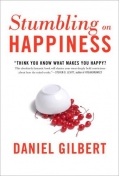BKMT READING GUIDES
Stumbling on Happiness
by Daniel Gilbert
Hardcover : 304 pages
2 clubs reading this now
2 members have read this book
Why are lovers quicker to forgive their partners for infidelity than for leaving dirty dishes in the sink? Why will sighted people pay more to avoid going blind than blind people will pay to regain their sight? Why do dining companions insist on ordering different meals instead of getting ...
Introduction
Why are lovers quicker to forgive their partners for infidelity than for leaving dirty dishes in the sink? Why will sighted people pay more to avoid going blind than blind people will pay to regain their sight? Why do dining companions insist on ordering different meals instead of getting what they really want? Why do patients remember long medical procedures as being less painful than short ones? Why do home sellers demand prices they wouldn’t dream of paying if they were home buyers? Why are shoppers happier when they can’t get refunds? Why do pigeons seem to have such excellent aim; why can’t we remember one song while listening to another; and why does the line at the grocery store always slow down the moment we join it?
In this brilliant, witty, and accessible book, renowned Harvard psychologist Daniel Gilbert describes the foibles of imagination and illusions of foresight that cause each of us to misconceive our tomorrows and misestimate our satisfactions. Vividly bringing to life the latest scientific research in psychology, cognitive neuroscience, philosophy, and behavioral economics, Gilbert reveals what scientists have discovered about the uniquely human ability to imagine the future, and about our capacity to predict how much we will like it when we get there. With penetrating insight and sparkling prose, Gilbert explains why we seem to know so little about the hearts and minds of the people we are about to become.
Excerpt
Journey to ElsewhenO, that a man might know The end of this day’s business ere it come! Shakespeare, Julius Caesar Priests vow to remain celibate, physicians vow to do no harm, and letter carriers vow to swiftly complete their appointed rounds despite snow, sleet, and split infinitives. Few people realize that psychologists also take a vow, promising that at some point in their professional lives they will publish a book, a chapter, or at least an article that contains this sentence: “The human being is the only animal that . . .” We are allowed to finish the sentence any way we like, of course, but it has to start with those eight words. Most of us wait until relatively late in our careers to fulfill this solemn obligation because we know that successive generations of psychologists will ignore all the other words that we managed to pack into a lifetime of well-intentioned scholarship and remem- ber us mainly for how we finished The Sentence. We also know that the worse we do, the better we will be remembered. For instance, those psychologists who finished The Sentence with “can use language” were particularly well remembered when chimpanzees were taught to communicate with hand signs. And when researchers discovered that chimps in the wild use sticks to extract tasty ter- mites from their mounds (and to bash one another over the head now and then), the world suddenly remembered the full name and mailing address of every psychologist who had ever finished The Sentence with “uses tools.” So it is for good reason that most psychologists put off completing The Sentence for as long as they can, hoping that if they wait long enough, they just might die in time to avoid being publicly humiliated by a monkey. ...
Discussion Questions
No discussion questions at this time.Weblinks
| » |
Stumbling on Happiness Web Site
|
| » |
Publisher's Book Info
|
| » |
Author Q&A
|
| » |
Reviews
|
| » |
Stumbling on Happiness Reading Guide/Seminar
|
| » |
Author Daniel Gilbert's Blog
|
Book Club Recommendations
Recommended to book clubs by 0 of 0 members.
Book Club HQ to over 90,000+ book clubs and ready to welcome yours.
Get free weekly updates on top club picks, book giveaways, author events and more








